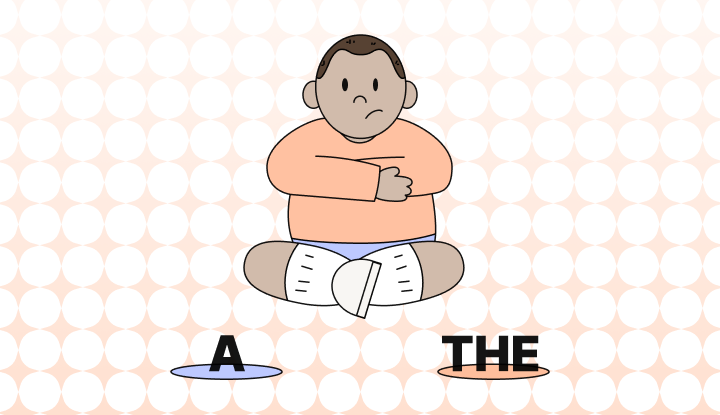幼い頃から英語圏の国で生活しながら、自然に英語が身についた場合でなければ、すなわちネイティブではない人が冠詞を適切に使いこなすのは非常に難しいことです。専用の英語教材があるぐらい冠詞を正確に使うのは難しい問題です。 このブログ記事では、冠詞の使い分けにつきまして解説します。
以下は例文です。
- Could you hand me the book?
- Could you hand me a book?
上記の例文で、どの文章が正しいかは、「何を言いたいか」によって異なります。一つ目の文章は、話し手が示す特定の本を意味します。 冠詞「the」は、話し手の言った本がどんなものなのかを聞き手が既に知っている場合に使われます。
2つ目の文章は、話し手が任意の本について話す場合です。 特定の本を意味するものではありません。
以下は別の例文です。
- Can you hand me the book on the table?
- Can you hand me a book on the table?
たとえば、聞き手の近くにあるテーブルの上に本が一冊だけあった場合、話し手が示す本は、テーブルの上にある本を意味します。テーブルの上に何冊かの本があり、話し手または聞き手の人が直前に特定の本について話し合ったことがあったら、話し手が示す本は先ほど言及したその本を意味します。
しかし、テーブルの上に何冊の本があって、話し手がその中でどれかの本を聞き手からもらいたい場合なら、正しい冠詞は「a」です。
普通「the」は特定のものを示し、「a」と「an」は一般的なものを意味します。
「A」と「An」
一般的な事物を意味する場合は、「a」または「an」を使います。 その単語がアルファベットの子音の発音から始まる場合、単語の前に「a」を付け、母音字の発音から始まる場合、「an」を付けます 。
英語での母音字は、“A”、“E”、“I”、“O”、“U”があります。 それ以外はすべて子音字となります。
• A apple a day keeps the doctor away. → An apple a day keeps the doctor away.
• Appleは、“A”、つまり母音字から始まります。
• Can you tell me an bedtime story? → Can you tell me a bedtime story?
• Bedtimeは、“B”、つまり子音字から始まります。
• I’ll meet you in a hour. → I’ll meet you in an hour.
• Hourは、“H”から始まりますが、発音は“O”と同じ発音から始まります。
• My daughter thought she saw an unicorn. → My daughter thought she saw a unicorn.
• Unicornは、“Y”と同じ発音から始まります。
• Have you watched a NBA game before? → Have you watched an NBA game before?
• NBAは、“E”と同じ発音から始まります。
冠詞を付けてはいけない場合は、以下のとおりです。
• 名前の前
• The Sarah finished school when she was 18. → Sarah finished school when she was 18.
• 組織および団体名、記念日、本の名前、そして映画のタイトルの前
• The NASA has been observing Jupiter’s moons. → NASA has been observing Jupiter’s moons.
• Did you go home for the Christmas? → Did you go home for Christmas?
• We read Charlotte’s Web in third grade.
• My English teacher showed us the Gone with the Wind last Thursday. → My English teacher showed us Gone with the Wind last Thursday.
• Before most city and country names.
• Have you ever visited the Paris? → Have you ever visited Paris?
• My family and I traveled to the Brazil over the summer. → My family and I traveled to Brazil over the summer.
• Some exceptions: The Hague, the Netherlands, the Philippines, the Gambia
• 冠詞を付けずに使う単語(society、homeなど)の前
• The society has changed over the years. → Society has changed over the years.
• She went the home because she felt sick。 → She went home because she felt sick.
• 特定の言語名(Japaneseなど)の前
• Sarah learned the Spanish in high school. → Sarah learned Spanish in high school.
• スポーツ関連の単語の前
• Jimmy played the basketball all throughout college. → Jimmy played basketball all throughout college.
ただし、上記で冠詞を付けずに使う単語でも、他の名詞を形容する用途で表現する場合は、冠詞が必要な場合がほとんどです。
• The NASA satellite landed on the moon nine years ago. • Did you get an outfit for the Christmas party? • The Inception fanbase was enthralled by blogger’s interesting interpretation of the film. • The media does not talk about the Paris slums often. • We visited the home of Martin Luther King Jr. • You can purchase the Spanish textbook online. • The basketball game was canceled due to the pandemic.
英語が難しい理由は、こういった文法や規則には常に例外があるからです。それにネイティブではない限り、このようなルールを自然に身につけたり、正確に覚えて使うのは不可能に近いと言われます。単語表現に冠詞が必要かどうか、必要であればどの冠詞を使うべきか、わからない場合は、Engramを利用してみてください。 文脈に合わせて冠詞の使い分けを正確に提案・校正してくれます。
Engramは、以下のリンクから利用できます。

参考資料:














